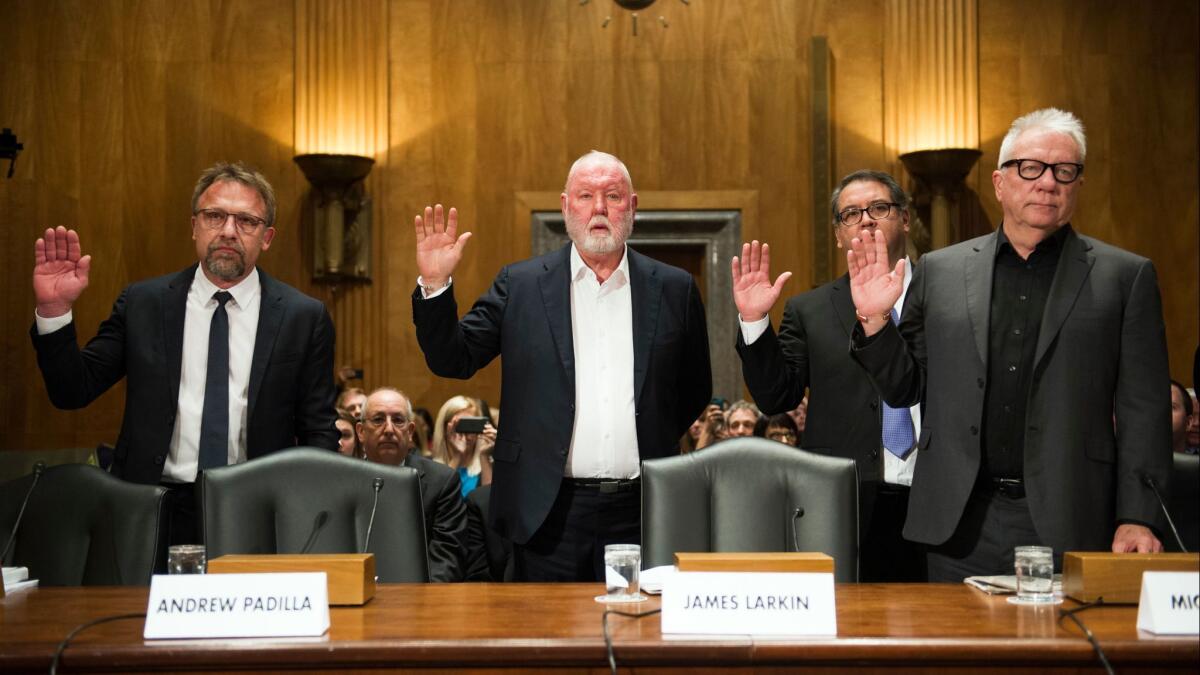Editorial: Congress’ pursuit of Backpage.com is risky

- Share via
The internet has been a tremendous force for good in the world, creating untold opportunities to connect, communicate, learn, create and make a living. But many of the properties of the net that make good things possible also enable less desirable pursuits, and even evil ones, on a vast scale. Congress is now focused on one of the worst of those pursuits: sex trafficking. It’s taking particular aim at websites like Backpage.com that run ads for prostitutes, some of whom have been shown to be underage or adults who are effectively enslaved. But in their efforts to give prosecutors and victims more power in court, lawmakers are poised to weaken a legal protection that has helped produce much of what’s good about the net.
That would be Section 230 of the federal Communications Act, which grants online companies immunity from liability for posting content from their users without modification. That’s why, if someone posts a defamatory image on Facebook, Facebook isn’t liable — the person who uploaded it is. The section provides a clear guideline for how to stay on the right side of the law, while also eliminating the costly burden of having to keep up with a patchwork of 50 states’ statutes. Those protections are particularly helpful to small companies and start-ups that rely on user-generated content, such as the ones that grew up to become Twitter, Craigslist and Snap.
Efforts to give prosecutors and victims more power in court are poised to weaken a legal protection that has helped produce much of what’s good about the net.
Yet as important as Section 230 has been to internet entrepreneurs and users, it has frustrated some prosecutors and claimants by forcing them to track down individual, often anonymous users, rather than targeting the websites that host the content. That’s the impetus behind the two bills aimed at sex trafficking: HR 1865, a recently passed House bill known by the acronym FOSTA, and S 1693, a bill dubbed SESTA that’s been awaiting action on the Senate floor.
State prosecutors, such as then-California Atty. Gen. Kamala Harris, and alleged victims of sex trafficking have brought multiple charges and claims against Backpage, only to have courts dismiss them because of Section 230. Although there’s no shortage of evidence that sex traffickers have used Backpage and that the company has profited from those ads, company executives have insisted throughout that they host such ads unwittingly, and that when they become aware of problems, they help police identify and arrest lawbreakers.
The Senate bill would rewrite the federal sex trafficking law exempt from Section 230’s immunity, allowing companies to be prosecuted not just for participating in sex trafficking, but also for “knowingly assisting, supporting or facilitating” it. But that approach would actually make it harder to convict sites that are deliberately assisting sex traffickers, the U.S. Department of Justice has warned, because it would require prosecutors to show that the site operators knew of specific instances of minors being offered for sex or adults being coerced into prostitution. At the same time, it would encourage sites that monitor their users’ posts to stop doing so, just so they could avoid even being accused of knowingly assisting traffickers.
A previous version of the House bill would have taken a more workable approach, barring sites from being operated “with the intent to promote or facilitate the prostitution of another person.” But the bill was amended on the House floor to add provisions similar to the Senate bill, importing all of those problems. It also would the restrictions and penalties retroactively, which the Justice Department said, with typical understatement, “raises a serious constitutional concern.” It’s not a concern, it’s a flatly unconstitutional change in the law.
Tellingly, both the House and Senate bills are supported by a trade association representing the dominant internet companies, while they are opposed by one representing start-ups. The Facebooks of the world can afford the uncertainty. The companies that want to be the next Facebook cannot.
The irony is that, as a Senate investigation last year contended, Backpage may not be entitled to immunity under Section 230. It’s now facing a Justice Department investigation and a renewed lawsuit by trafficking victims in Boston. If Congress simply cannot wait to see how those cases turn out, there is a middle ground — it could give state attorneys general clearer authority to go after websites that violate federal sex trafficking laws. But if it insists on carving out a bigger hole in Section 230 to battle sex trafficking, it’s only a matter of time before it comes under pressure to address another evil, and then another, and then another. And before you know it, there will be nothing left of Section 230.
Follow the Opinion section on Twitter @latimesopinion and Facebook
More to Read
A cure for the common opinion
Get thought-provoking perspectives with our weekly newsletter.
You may occasionally receive promotional content from the Los Angeles Times.









